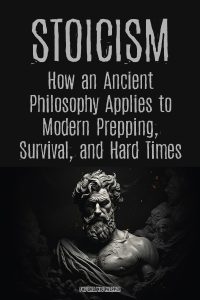(Psst: The FTC needs me to remind you that this web site comprises affiliate hyperlinks. Meaning when you make a purchase order from a hyperlink you click on on, I would obtain a small fee. This doesn’t enhance the worth you may pay for that merchandise nor does it lower the awesomeness of the merchandise. ~ Daisy)
By the creator of Road Survivalism: A Sensible Coaching Information To Life In The Metropolis and The Final Survival Gear Handbook
In life, it’s important to stability motion, mindset, and spirituality. In relation to preparedness and survival, I strive my greatest to maintain visiting between these three necessities always, for myself and likewise in my steerage work and writings. I discover Stoicism to be significantly useful.
Motion and mindset may be pragmatic, useful. However non secular issues are extra intimate, extra private. One can discover no matter one’s searching for – energy, religion, dedication, inspiration, solace – in faith, philosophy, and different practices, even bodily ones. The sweetness is that these aren’t mutually unique. Actually, they will complement one another.
This time, I’ll discuss philosophy. It may be a code of conduct, a sensible and actionable information for a greater life. In that sense, it shares that historical, profound, highly effective knowledge and better aspirations of most, if not all, religions. Simply as nicely it could possibly additionally show useful, significantly throughout laborious instances resembling what we’re going by in a lot of the Western world.
Folks might roll their eyes and deem “philosophy” overly theoretical, tutorial, or too distant from their actuality. Nonetheless, women and men of motion have been utilizing philosophy all through historical past and to at the present time to beat obstacles and obtain private progress and victories in all areas of life: relationships, careers, enterprise, adventures, courts, and battlefields. So why not in preparedness and survival?
What’s Stoicism?
Stoicism is a faculty of Hellenistic philosophy based in Athens, Greece, by Zeno of Citium within the early third century BC. Probably the most well-known practitioners and promoters are Epictetus, Cato, Seneca, and Marcus Aurelius, thought-about one in every of Rome’s wisest emperors.
|
Stoicism asserts that advantage and judgment are primarily based on conduct relatively than phrases. Subsequently, it’s not some theoretical idea, a lot much less an instructional debate with esoteric propositions.
It’s a really actionable philosophy comprised of easy but stable, confirmed, and – most significantly – actionable rules that carry the knowledge of time-tested practices. That’s why it yields sensible outcomes.
Why Stoicism?

I’ve edited out that half in a current revision to enhance the objectiveness and free some area for extra on-point content material associated to road survival (the stuff I share right here on TOP). Nonetheless, I nonetheless share its tenets at any time when I’ve the chance to try to see if they will profit from it as a lot as I do, all the time taking care to not be preachy. And above all, I observe its core precept – that’s, extra by actions than phrases.
Beneath, I assessment among the essential Stoic rules and the way they relate to preparedness and survival. It might appear that some overlap in components. Nonetheless, I imagine it bears visiting every to understand the nuanced insights and knowledge they supply individually and collectively.
“Deal with what you’ll be able to management.”
The central tenet of Stoicism is, on the similar time, the simplest and highly effective. One. It’s Selco’s idea of huge and small circles and much more.
“The chief activity in life is just this: to determine and separate issues in order that I can clearly inform myself that are externals not underneath my management, and which need to do with the alternatives I truly management. The place then do I search for good and evil? To not uncontrollable externals, however inside myself to the alternatives which can be my very own…” — Epictetus
One other manner of expressing that concept is “we don’t management what occurs, however how we reply.” That’s vital in life, irrespective of the context. Nonetheless, it turns into much more highly effective throughout difficult instances like now and much more so if TSHTF as a result of that’s when focusing our vitality and efforts on ourselves, our ideas and our actions is the one manner to enhance our scenario.
“Observe Misfortune”
Historical Stoics of all walks of life would abandon their possessions, leaving their houses sometimes to wander the streets or nation for a interval, experiencing life with little or no or no possessions, comforts, and conveniences.
“Seneca, who loved nice wealth because the adviser of Nero, recommended that we should put aside a sure variety of days every month to observe poverty. Take slightly meals, put on your worst garments, and go away the consolation of your house and mattress. Put your self nose to nose with need, he mentioned, you’ll ask your self “Is that this what I used to dread?”
It’s vital to keep in mind that that is an train and never a rhetorical gadget. He doesn’t imply “take into consideration” misfortune, he means to reside it. Consolation is the worst sort of slavery since you’re all the time afraid that one thing or somebody will take it away. But when you cannot simply anticipate however observe misfortune, then probability loses its potential to disrupt your life. [SOURCE]
Training what we worry and coaching adversity can present maturity, knowledge, a extra profound life expertise, and finally make hardship much less fearful and extra bearable (when it inevitably comes). Based mostly on that concept and the urge to change into extra resilient and higher ready for troublesome instances (amongst different private targets), I made a decision to observe that doctrine and began going out on the streets amidst the homeless.
“This too shall go.”
All the things is transient, cyclical. Basic Spanish Creator Miguel de Cervantes put that concept completely in his masterpiece novel Don Quixote:
“For neither good nor evil can final eternally, and so it follows that as evil has lasted a very long time, good should now be shut at hand.”
This additionally encapsulates a few vital classes or reminders: to maintain hopeful and see the sunshine on the finish of the tunnel when SHTF or the instances are dire and to understand, be grateful, and luxuriate in absolutely when instances are good.
“Memento Mori“
Translated actually, memento mori means, “Bear in mind it’s essential to die.”
Meditating on dying can provide us energy, braveness, and a dose of serenity to face adversity and hazard. Don’t sweat the small issues. Don’t take every little thing so significantly. All the time remind your self nobody lives eternally. So be good, do good issues, and be humble.
Marcus Aurelius mentioned:
We may go away life proper now. Let that decide what we do and say and suppose.
That’s a proposition to information our actions in one of the best, extra simply, and respectable manner as if these are our final deeds on earth as a result of they may as nicely be.
“Premeditato Malorum”
Premeditato Malorum means “the premeditation of evils.”
To place it one other manner, “working towards unfavourable visualization” can nicely be thought-about one other staple of preparedness. Imagining eventualities and issues that may go fallacious helps us put together for setbacks and losses, that are inevitable.
However concentrate: that’s not the identical as partaking in a unfavourable spiral of ideas or inaction. Dwelling in doom and gloom is counterproductive. Utilizing unfavourable visualization to strategize, plan and act is an train that builds preparedness and confidence.
“We endure extra in creativeness than in actuality.”
If we endure in anticipation, we endure greater than essential. That’s frequent if we reside an excessive amount of previously or sooner or later and too little within the current.
It’s additionally counterproductive and never primarily based in actuality as a result of our creativeness could make issues and conditions a lot worse than they’re, particularly ones that may occur sooner or later or on account of our actions and selections. As Seneca explains:
“We’re within the behavior of exaggerating, or imagining, or anticipating, sorrow.’ In doing so, we put ourselves in a psychological disposition which is incommensurate with the scenario we occur to be in really. We lose observe of the current, and we embellish the long run with our fears and insecurities. Oftentimes, our biggest internal turmoil just isn’t an ailment of actuality, however an unconscious manifestation of our perceived shortcomings…The fast consequence of the hole between notion and actuality is that on the person… the largely self-inflicted, however nonetheless perturbing, anguish of the thoughts.”
“Amor fati”
Amor fati interprets to “love of 1’s destiny.”
Deal with every little thing that occurs and each second, even dangerous ones, as one thing to be embraced and lived absolutely. Regardless of how difficult or difficult or dangerous the scenario, all of it occurs because it ought to. We’re small and ignorant in regards to the larger designs, unable to see the larger objective of every little thing. Nevertheless it exists, and we should embrace no matter comes our manner with braveness and dedication.
The rules of stoicism communicate for themselves.
These rules communicate for themselves. They’re profound however, on the similar time, actionable and thus serve a really sensible objective if we are able to repeatedly mirror on and internalize them.
There are various different Stoic aphorisms that may assist preppers have a greater life now and likewise if instances get dire. Beneath, I present a couple of on-line and printed sources to encourage and information these searching for extra about Stoicism.
Books
Meditations, by Marcus Aurelius
The Impediment Is the Approach: The Timeless Artwork of Turning Trials into Triumphs, by Ryan Vacation
Ego Is The Enemy, additionally by Ryan Vacation
Web sites
Each day Stoic – Historical Knowledge For On a regular basis Life
Aurelius Basis
Do you utilize Stoic practices?
Have you ever studied Stoicism? Do you discover it to be a helpful philosophy? Is it one thing you might see making use of to your preparedness efforts? Is there one other philosophy you discover helpful?
Let’s discuss it within the feedback part.
About Fabian
Fabian Ommar is a 50-year-old middle-class employee residing in São Paulo, Brazil. Removed from being the super-tactical or extremely skilled army survivor sort, he’s the typical joe who since his youth has been concerned with self-reliance and outside actions and the sensible aspect of balancing life between an enormous metropolis and rural/wilderness settings. Because the 2008 world financial disaster, he has been coaching and serving to others in his space to change into higher ready for the “fixed, slow-burning SHTF” of residing in a third world nation.
Fabian’s e-book, Road Survivalism: A Sensible Coaching Information To Life In The Metropolis , is a sensible coaching methodology for frequent metropolis dwellers primarily based on the life-style of the homeless (real-life survivors) to be extra psychologically, mentally, and bodily ready to take care of the tough actuality of the streets throughout regular or troublesome instances. He’s additionally the creator of The Final Survival Gear Handbook.
You possibly can observe Fabian on Instagram @stoicsurvivor


